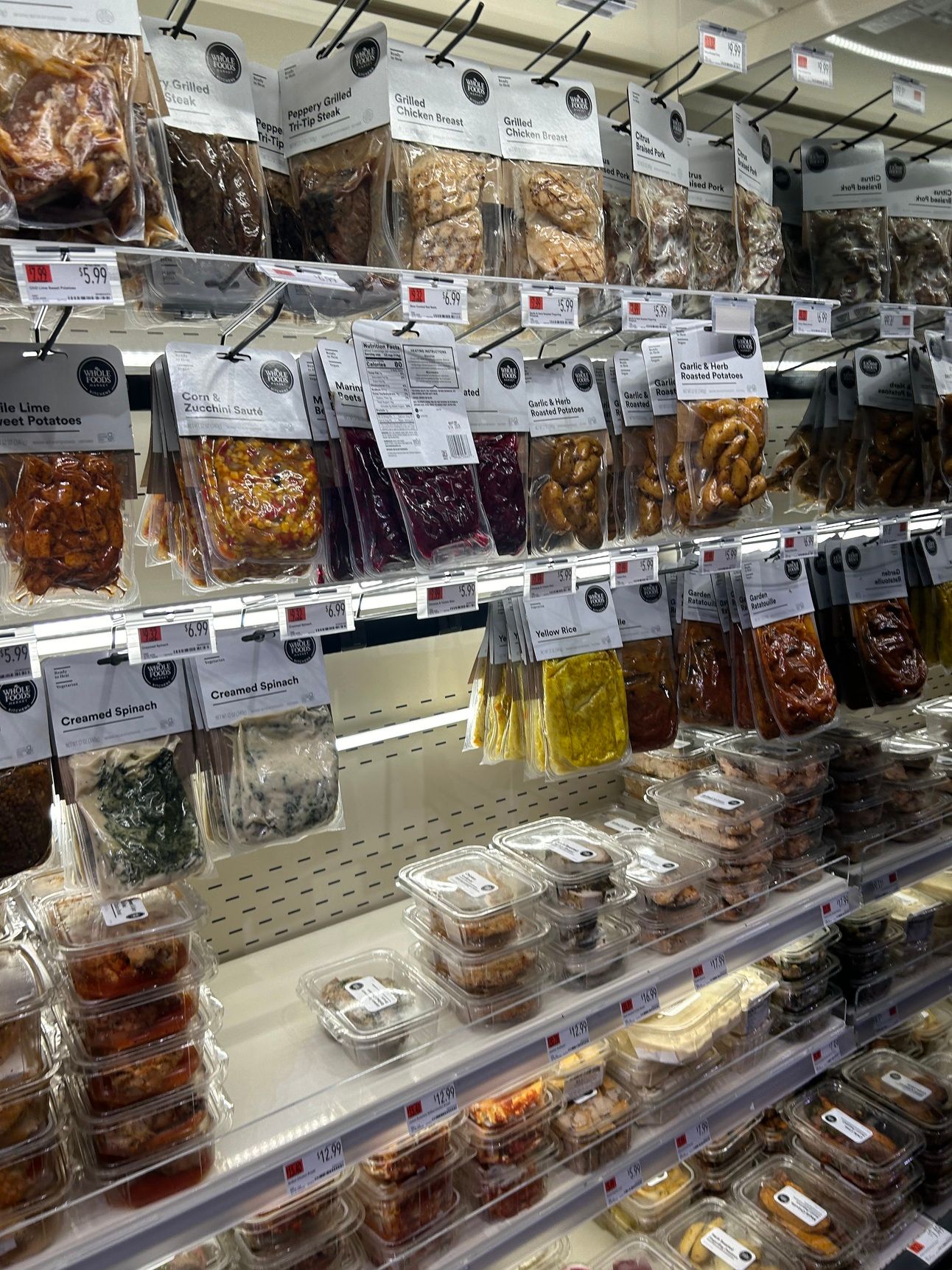
Issue #19: Whole Foods Daily Shop Disappoints

Whole Foods Market Daily shop taken by yours truly
Yesterday, it was raining in NYC. What better time to peruse the aisles of the new Whole Foods Daily Shop on the Upper East Side (68th & 3rd) than a cold and rainy day?
The purpose behind the roughly 9,000-square-foot location is to cater to people’s daily food-buying trips, competing with bodegas, convenience stores, grocery stores, and restaurants. It features most of the traditional items you would see in a grocery store, albeit with fewer options per item, and a large focus on snacks, prepared foods, and meals compared to the average grocery store. Overall, I loved the concept, and was disappointed, but I would definitely utilize it frequently if it was in my area.
I was expecting a cross between the Whole Foods food court and an Eataly. Quick, healthy, experiential, prepared foods. Unfortunately, that was not the case. Here are my concerns with the new concept:
No Seating
No Salad Bar
Lack of Experiences
No Hot Bar
Everything Was Pre-Made and Pre-Portioned
I understand why these factors were omitted but to differentiate in such a crowded market, some of these will need to be changed. Already Whole Foods is planning two more Daily Shop locations at 409 E 14th Street and at 301 West 50th Street. It will be interesting to see based on this pilot location what if any changes are made. I would recommend leaning into experiences, give customers the ability to customize, and add seating. Regardless, I am excited to see this concept evolve and think it could be a big success if the proper adjustments are made.

Sous Vide, Pre-Seasoned Items that just need to be baked

Concept of The Estate provided by SBE
A New Healthcare-Focused Hospitality Service: The Estate 🏨
Sam Nazarian, the founder of SBE Entertainment, a restaurant and hotel company, and Tony Robbins, the motivational speaker, announced the launch of The Estate. This new premium hospitality company will focus on healthcare/longevity hotels and residences. For the healthcare services, The Estate has partnered with Fountain Life, a premium personalized healthcare offering. Some of the healthcare services offered include preventative diagnostics, holistic treatments, exercise prescriptions, and nutritionists. To me, it is fascinating to see the trend of hospitality/living and healthcare blending. By making it very easy to integrate into your life, in theory, more people will do preventative healthcare. You see this trend manifest with all the smart devices, like beds and watches, that are able to track everything, including healthcare statistics and their widespread adoptions. As people place further emphasis on longevity, I believe integrating it into your daily life will be crucial. While The Estate is focused on a premium customer, it will be interesting to see how the trends expand. According to the National Academy of Medicine, missed prevention opportunities cost the United States $55 billion annually. A big opportunity to help reduce that gap and it seems like retail will play a big part in it as retail is so ingrained into people’s lives.
Stitch Fix Earnings Call 📉
This week, Stitch Fix, the consumer clothing subscription box, had its earnings call reviewing the past fiscal year. Overall, the business continues to struggle. Despite beating revenue expectations by around 1%, compared to last year, revenue decreased by about 12%. Just as concerning, the number of active clients who use the service dropped as well. In order to pick business back up, Stich Fix is planning on leveraging AI and data science to better their personalization, engagement, and recommendations. It certainly has plenty of data to leverage, but it just seems like Stitch Fix is always going to struggle given the high costs of curation and not receiving a ton of revenue/margin per item. I am a strong believer that for an apparel company to be successful at scale, it requires a strong omnichannel presence, which Stitch Fix lacks. Regardless it seems like revenue growth will be a larger priority going forward, and it will be interesting to follow along if they are able to restart growth.
Personalization: Beverage Edition 🥤
This week, Priya Krishna, the interim NYT food critic after Pete Wells stepped down, and a co-host of one of my favorite podcasts, Recipe Club, penned a piece on the rise of ultra-personalized beverages. This trend has taken over beverages. Americans have been switching to these sweet, caffeinated beverages, spurred by chains like CosMcs, Dutch Bros, Swig. Incumbents like Starbucks have hopped on this wave too. At the trends core are two key themes:
Personalization: Consumers want things to their liking and, according to McKinsey, 76% of consumers say they’re more likely to purchase from brands that personalize
Sweet & Caffeine is Still Popular: Despite what the headlines say, people are not only focused on better-for-you. According to Melissa Abbott, a consumer research consultant, “People will continue to drink their classic diet sodas but we are seeing a slow migration away from artificial sweeteners.”
Sweet is here to stay. As is people being able to decide what is in their beverages. Both trends are something to keep an eye on as brands and retailers, that will need to be incorporated into strategy. Where I do think these aforementioned chains will struggle is the ingredients. Customers are okay with sugars and fats, but they tend to want natural items, not artificial and processed. Finding that balance will be crucial going forward. Sweet, but natural. Like what Rockman Bakery in Austin is focusing on. I am excited to follow along the rise of sweet and fats products with natural ingredients.
When choosing a food item, which do you prioritize?
Tupperware Files for Bankruptcy
Sometimes brands can be an entire category. Pass me the Kleenex. Do you have any Band-Aids? I need a Tupperware for this food. Kleenex, Band-Aids, and Tupperware are all brands that defined categories. Despite Tupperware dominating the food storage category since post-World War II, it has accumulated about $800M in debt and filed for Chapter 11 bankruptcy. In terms of customer acquisition, Tupperware was very famous for the Tupperware parties, where suburban women would sell to their friends and neighbors. It helped them catapult to the top of the category, but in current times is not a super effective strategy. Most of their competitors have leaned heavily into eCommerce, whereas Tupperware has just started to branch into that selling channel. According to Tupperware, 90% of its revenue comes from direct sale parties, whereas overall, in the category, only 4% of products are sold this way. Furthermore, customers are trying to avoid plastic, with 71% of Americans believing the US needs to reduce its reliance on plastic. These macro trends are concerning for Tupperware and it shows how not adopting an omnichannel selling strategy can hurt you.
What was your favorite trend this week?

Summary: Saral is a platform to manage influencer outreach, track affiliate sales, and build influencer relationships
Founder(s): Yash Chavan
How this will shape the future of commerce: Influencers are a huge channel to boost revenue going forward and can be very difficult to manage all the moving pieces
Why should you use this technology?: It simplifies the process of managing influencers
Notable Clients: Branch, Brez, Samsung, Brooklinen
Pricing: starting at $499 per month
My take: Influencers can help drive revenue in retail and online, but given the typical need to work with many, it helps to have software to organize, manage, and optimize the process
Interested? Book a demo here
Additional Links:
Costco breaks ground on its South LA mixed-use development with a smaller format Costco store and 800 apartment units (read more here)
The rise of eating and entertainment - a peak behind the scenes with the founder of Your 3rd Spot (read more here)
My Take: I am very bullish on eatertainment and excited to see new innovations in the space
Contrary to popular belief people are being more spontaneous with their reservations and booking same day (read more here)
FIGS, the medical apparel brand, has opened its second retail store and first on the East Coast in downtown Philadelphia (read more here)
Tempur Sealy agrees to divest from almost 200 stores as part of its merger with Mattress Firm (read more here)
Kay Jewelers is updating stores and product mix to attract younger shoppers (read more here)
Retail sales up just over 4% in August (read more here)
DoorDash launches product to allow merchants to white label their own websites and apps using Doordash technology (read more here)
Walmart, Amazon, and Target all announce early October promotion days (read more here)
Kmart is closing last full size store in the US (read more here)
Nike employees are stoked by the new CEO Elliott Hill (read more here)
My Take: Starting as an intern at a company and moving your way up gets you a lot of friends - Hill has spent three decades at Nike!
Meta launches new AR glasses Orion (read more here)
L Catterton acquires Solidcore (read more here)
Vail Resorts releases earnings (read more here)
Was this forwarded to you? Sign up here.
Have an idea or want to chat? Respond to this email.
Is the email not reaching your inbox? Try this trick.

